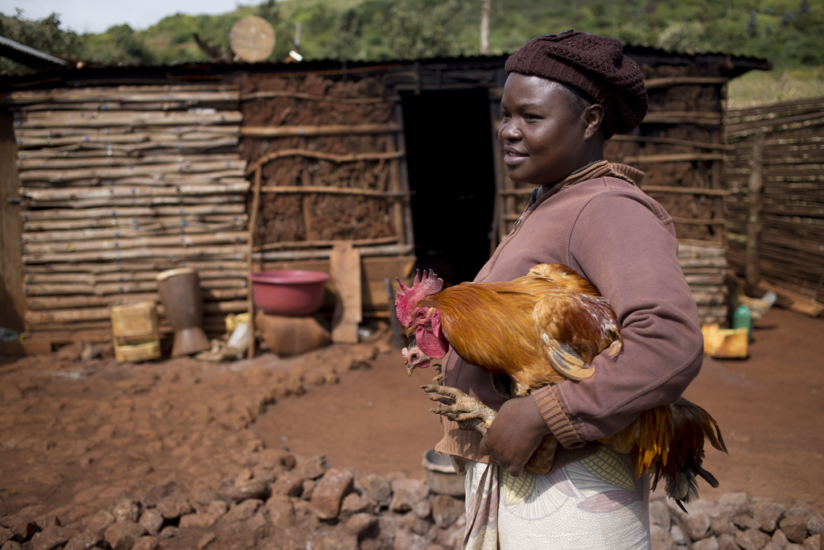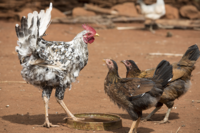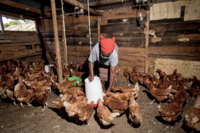With Africa’s population set to double, new technologies, including improved poultry vaccination, will be necessary to provide enough affordable, quality protein.
An ambitious new 4-year project aims to help 150,000 small-scale poultry producers in Africa to become more productive and efficient by building their businesses and overall sustainability. The PREVENT project (PRomoting and Enabling Vaccination Efficiently, Now and Tomorrow) will see more than 50 million hatchery-vaccinated day-old chicks distributed annually.
Improvement in poultry production is one of the most promising options to provide affordable protein and other essential nutrients to Africa’s rapidly growing population. Each year, Africa’s population grows by the equivalent of another France (or Thailand) and is projected to double to around 2.5 billion people by 2050. Currently, more than 250 million people in Africa are undernourished and almost one billion cannot afford a healthy diet. The trends for both are upwards.
The PREVENT project, a partnership between Ceva Santé Animale (a global veterinary health company) and GALVmed (a not-for-profit that makes livestock vaccines, medicines and diagnostics accessible to small-scale producers), with the support of the Bill & Melinda Gates Foundation, will work with 36 medium-sized hatcheries spread across eight Africa countries. The project will enable the hatcheries to provide high-quality, vaccinated day-old chicks to small-scale producers together with practical advice and guidance from a team of field technicians.
To date, the effectiveness of poultry vaccination in Africa has been limited. High temperatures hamper distribution of vaccines, which mostly need to be kept cold. Combined with lack of information about circulating infectious diseases, rural producers can have their flocks and livelihood wiped out overnight.
By providing small-scale producers with better quality chicks, which are already effectively protected from the major infectious poultry diseases before they arrive on the farm, together with improved flock health and husbandry advice, the project aims to cut waste and make poultry production across the target countries much more sustainable.
Currently, major animal health businesses, such as Ceva, focus their vaccine marketing efforts on large-scale hatcheries. This project will enable Ceva, which is co-funding the project, to expand its focus to include medium-sized hatcheries and therefore extend the benefits of rearing hatchery-vaccinated chicks to more small-scale poultry producers.
Today, the absence of local technical support is also a major block to improving the efficiency of poultry production. Field technicians will serve as the link between the hatcheries and producers, as well as providing advice and technical support, they will also distribute vaccinated chicks to smaller-scale producers giving them equal opportunity to grow their businesses.
The project plans to be gender transformative by aiming to have women actively participate in 60% of the small-scale poultry enterprises targeted.
Finally, the large-scale and geographically dispersed nature of the project will offer unprecedented levels of access and insight into the emerging commercial poultry sector in Africa. It is hoped that the information generated and shared by the project will encourage other businesses, such as feed, genetics and equipment suppliers to invest and support the sector.
Enrique Pando, GALVmed’s Director for Commercial Development said:
“GALVmed is committed to accelerating the availability of technologies that are beneficial for small-scale producers. We are happy to be part of this collaboration that will increase small-scale poultry producers’ access to healthy day-old-chicks, enabling them to reduce their production costs, expand their businesses and substantially increase their profit margins while improving their quality of life.”
For Ceva, Dr. Pierre-Marie Borne, Public Health Director and Ceva’s lead for the project commented:
“The PREVENT project will make the latest technological innovations, such as, hatchery-vaccinated day-old chicks and technical support available to small-scale poultry farmers across Sub-Saharan Africa. This will strengthen and broaden poultry production in rural areas, enhancing the capacity of smaller farmers to respond to the enormous challenge of producing enough high-quality protein to meet the needs of Africa’s rapidly growing population.”






